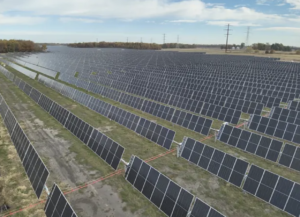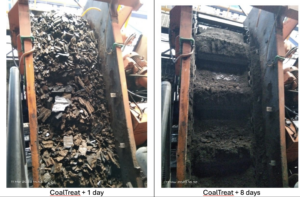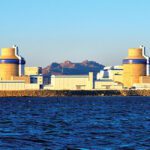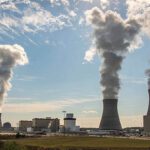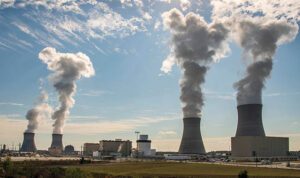
As nations compete for energy dominance, America’s policy framework demands strategic clarity and bold ambition, and nuclear must be at the center of it.
As an advocate for an “all-of-the-above” approach where the U.S. invests in energy sources that make sense and are proven economically viable at scale, I champion natural gas for its flexibility, renewables where they deliver reliability, and nuclear power as the indispensable backbone. Nuclear, however, is not merely a domestic energy solution; it is the linchpin of U.S. geopolitical strength, enabling energy exports, countering autocratic influence, and upholding global nonproliferation.
COMMENTARY
President Trump’s vision for American energy dominance, coupled with Secretary of Energy Chris Wright’s leadership, sets a powerful course. Yet, their emphasis on nuclear power as a servant of artificial intelligence (AI) data centers risks missing the forest for the trees. This narrow focus, while forward-thinking, subordinates nuclear’s broader strategic imperative. The administration must course-correct, aligning around nuclear’s true role as a geopolitical force multiplier, investing in proven technologies, and partnering with the private sector to create a nuclear waste take-back regime to secure the fuel supply chain.
The administration’s focus on AI is understandable. Data centers are projected to require up to 90 gigawatts of new U.S. capacity by 2030, with global electricity demand doubling to more than 900 terawatt-hours. Nuclear’s capacity factor of 92% makes it ideal for AI’s relentless energy needs, outpacing natural gas (around 50%) and renewables’ intermittency. But framing nuclear energy primarily as an AI enabler, as seen in executive orders prioritizing reactors for data centers, reduces it to a tech-sector accessory. This risks overshadowing nuclear’s unparalleled geopolitical stakes, a misstep that fails to fully leverage the administration’s bold energy agenda. Analysts warn that such a narrow lens cedes ground to adversaries exploiting nuclear for influence. Nuclear’s role transcends AI. It’s about securing America’s global leadership.
China and Russia are aggressively expanding their nuclear exports to forge strategic dependencies that reshape global alliances. Russia’s Rosatom commands 60% of the global reactor export market, offering build-own-operate deals that lock countries like Turkey, Egypt, and Belarus into decades of reliance, often with fuel take-back provisions securing Moscow’s supply chain control. China, with 28 reactors under construction and plans for over 100 by 2035, exports its Hualong One technology to Pakistan and Kazakhstan via the Belt and Road Initiative, undercutting competitors with cheap financing. These moves secure resource access, expand influence, and erode U.S. leverage. America’s dwindling export share signals a failure to counter this, as reports highlight a “new nuclear age” fraught with risks. The administration’s nuclear export push is commendable, but its AI-heavy rhetoric risks diluting this broader fight.
Nuclear’s role in nonproliferation is equally critical, where U.S. leadership has long been the bulwark against global chaos. The 1968 Nuclear Non-Proliferation Treaty (NPT) hinges on America providing safeguarded technology to deter nations from pursuing weapons programs. Through Section 123 agreements, the U.S. mandates IAEA monitoring and fuel cycle restrictions, averting arms races in volatile regions like the Middle East. China and Russia’s lax safeguards heighten diversion risks, as Russia’s ties to Iran and North Korea highlight. The administration’s failure to prioritize a comprehensive nuclear strategy beyond AI weakens this regime, particularly as it lags on resolving nuclear waste gridlock, which is a barrier to industry growth.
To reclaim control, we must invest in energy that makes sense by partnering with the private sector to create a nuclear waste take-back regime. Such a program—modeled on international precedents but tailored to U.S. innovation – would allow the government to reclaim spent fuel from exported reactors, closing the fuel cycle loop and preventing sensitive materials from falling into the wrong hands. Private firms, with expertise in recycling and storage, could manage logistics under federal oversight, breaking the impasse where no permanent U.S. disposal site exists and reducing reliance on foreign suppliers like Russia for enriched uranium. This would bolster nonproliferation and make U.S. nuclear exports more competitive, thwarting China and Russia’s grip on global markets.
Nuclear’s geopolitical prowess also amplifies U.S. energy exports, a vital economic weapon. As the world’s top LNG exporter, shipping 11.9 billion cubic feet daily in 2024, America has displaced Russian gas in Europe, bolstering allies following the Ukraine invasion. A stronger nuclear fleet that handles domestic baseload would free up more natural gas for exports and mitigate price strains from rising demand. The administration’s export ambitions are laudable, but its AI focus overlooks this opportunity.
Economically, nuclear power proves its mettle at scale. Despite high upfront costs ($7-10 billion per gigawatt), its low operating expenses (fuel at just 28% of costs) and 60-80-year lifespans deliver long-term savings, outpacing gas’ volatility and renewables’ intermittency. Small modular reactors (SMRs), meanwhile, promise quicker, cheaper deployment, while creating high-wage jobs. This viability underpins my all-of-the-above stance: Nuclear complements gas and renewables for resilience.
President Trump and Secretary Wright’s energy vision is a strong foundation, but it must pivot to elevate nuclear’s geopolitical primacy over AI fixation. Streamline SMR permitting, expand EXIM Bank financing for exports, and forge public-private partnerships for a waste take-back program to secure the supply chain. This offers a bi-partisan solution that reclaims America’s edge in a multipolar world.
Nuclear power is America’s strategic cornerstone. Relegating it as AI’s sidekick squanders its potential to shape global security and prosperity. The stakes are nothing less than our nation’s future. It’s time to lead with clear eyes and bold action.
—Rabbi Yechezkel Moskowitz is the founder of Synergos Holdings and The Synergos Fund, and is founder and chairman of Curio.


